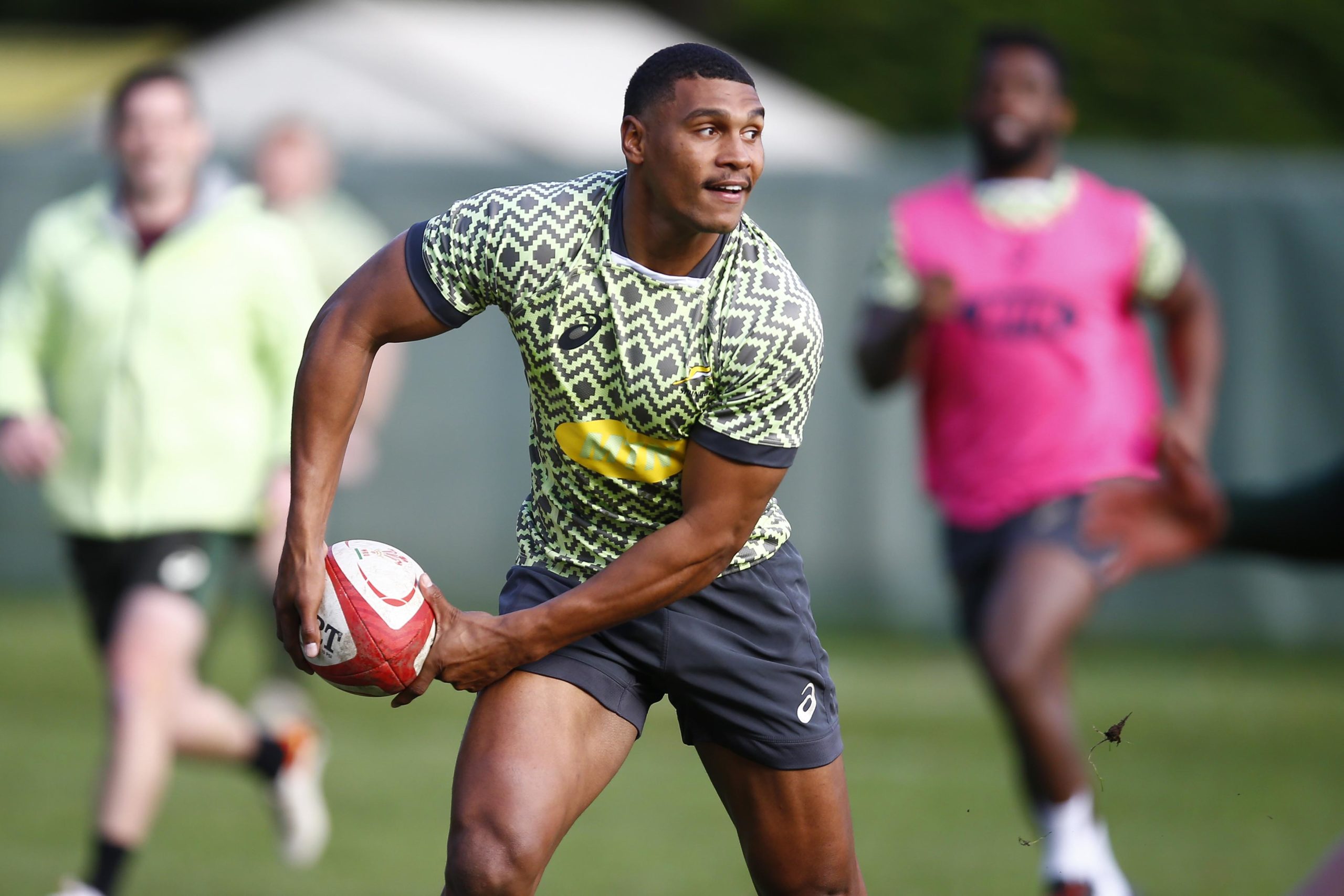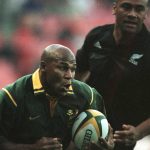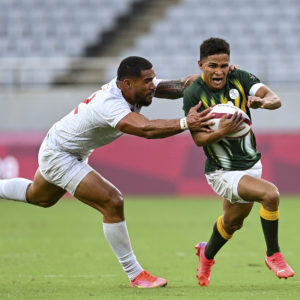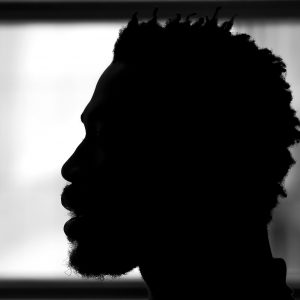The central Strand in the story of Damian Willemse
The rising Springbok star is on a mission to transform his home town by planting trees in an area that is still affected by apartheid’s spatial planning. But that is not all he is doing for his com…
Author:
13 November 2021

Head bopping. Eyes dancing. Feet shuffling in a rhythm of their own. The lone figure on Strand Beach on a Saturday morning could have been any youthful member of this Western Cape community, situated about 50km from Cape Town. Ahead of him are dozens of people meticulously cleaning up the beach for others to use it safely.
Only, this isn’t an ordinary Strand resident. This is a rugby world champion, an environmentalist and a young man pricking the social conscience of others who have a platform like his. Damian Willemse, 23, has risen to become a beacon of hope and inspiration, emphasising what can happen when talent and opportunity merge at the crossroads of sport.
Willemse used Strand Beach as his backyard growing up, bolting from the family home and the temptations of his neighbourhood to find purpose by the sea. “I’ve always found nature to have a calming effect on me,” he says.
This is a different Willemse, sans the Springbok badge and the careful answers that a press conference necessitates. This is Willemse at home and at ease. “When we were laaities, we used to play rugby all day here.”
Related article:
The options for entertainment in his youth were limited, with most of them leading to bad life decisions. Drugs. Gangsterism. Crime. Becoming yet another statistic. This was not part of his plan, so he ran to the sand. At that point, nature didn’t just calm him. It protected him from a life with regrets about a talent that was thrown away.
It isn’t always easy to look away from social ills when they confront you as starkly as they do in sections of the Western Cape. Willemse is now giving back to his community in various ways. On this particular day, he is doing a beach clean-up with friends, family and the support of Pura, Vida e Caffè and his primary sponsor, adidas.
“I appreciate the support of the friends I used to play here with,” he says, pointing to young men in red shorts who are part of the touch rugby club, The Reds, he used to play for on the beach. “To see the support of my community is amazing, because these are my people. This will always be home.
“It means a lot to me to be able to come back to my community and look after it. My sponsors have been very generous with their time and their assistance, and they know how important it is to me to do good here,” he explains. “Our environments shape us, but why can’t we shape our environment?”
Willemse is also a global ambassador for adidas’ Run for the Oceans campaign. Nature, and all it provides, is a gift that he guards jealously because he is aware of its importance in his own life.
Greening the environment
On following his brother Ramone Samuels to Paul Roos Gimnasium, the nursery of many esteemed Springbok players, one of the first things that struck Willemse was just how green everything around him was in Stellenbosch. “I had never seen that where I grew up, and it really hit home.”
He wants to plant trees in communities that lack the greenery and serenity of suburbia, starting with his own. “I was inspired by Héctor Bellerín, the Arsenal footballer, who is on a mission to plant 50 000 trees in the Amazon,” says Willemse. “If he can do that, why can’t I plant 500 trees as a start? As athletes, we have a platform, and I want to use mine to change the environment that kids like me grow up in.”
The Group Areas Act pushed communities like his out to the periphery of cities and often inhospitable sites where fauna and flora struggle to thrive. So the One Tree Planted campaign that Willemse is championing has had to be thorough in its research to determine what will flourish in Strand.
He is in no rush, however. As his rugby career has taught him, patience has its rewards.
Related article:
Given his versatile skill set, Willemse has been shuffled around the Bok backline, filling in wherever there is a need. For now, he is happy to learn and bide his time. But the Boks have been down this road before with versatile young players, and prodigies have become dilemmas because there is no clarity around their role.
As a schoolboy, Willemse was electric as the spark of a Paul Roos backline that ran from everywhere. He came through at a time when schoolboy rugby was given greater airtime, so his ability is not just a myth. There is evidence all over YouTube of what he did and what he is capable of.
The transition from being the chosen No. 10 to the multifunctional No. 23 is an inevitable part of going through the ranks, and Willemse is well aware that his time will come. “I am proud to play for my country. I’m surrounded by amazing people and players that I now call my friends,” he says. “These are heroes of mine, and now they are teammates. I’m very lucky and I know that time is on my side.”
Players who get cameos at the end of tight games are often easy targets for criticism, and Willemse has had his share already. More than that, because of the value that Western Province has put on him, some sections of the media have questioned why a kid from Strand warrants the millions rumoured to be in his package.
Using what you’ve got
Willemse says he got lucky when Caroline Rupert, the daughter of Johann Rupert, facilitated his bursary to go to Paul Roos. That single intervention dramatically changed the course of his life.
“I wouldn’t be the player I was then without my primary school coaches and I am eternally grateful for what they gave me,” he says. “But going to Paul Roos and wearing that jersey was huge. I will always be grateful to Caroline for the role she played in giving me that opportunity.”
As South Africa continues to grapple with the monstrous challenge of addressing the imbalances of the past, there are opportunities for those who have the means to assist those who have not. In return, the sincerest form of gratitude is for those who are granted access to opportunities to take them and use them in the manner that Willemse has.
Given the lack of full context around the Willemse narrative, his guard has been up when he is put in front of the media. And yet, at close quarters, he speaks with a refreshing candidness that belies his bashfulness in front of the mic. At a recent event, he waxed lyrical to a handful of schoolboy talents invited to share the stage with him, Springbok captain Siya Kolisi and others. Willemse is still crossing the divide between youthful talent and settled campaigner, so he relates easily to young players hyped to be the next big thing.
Related article:
He has, of course, saved most of his biggest statements for the rugby field, with eye-catching runs when he has been given the freedom to roam. His displays for Western Province eventually caught the attention of the national selectors, and his Test debut against Argentina was particularly poignant. “It was a dream come true. That was the first time that my mother has ever watched me play, because she gets so nervous,” he says. It was also the first time that she had been on an aeroplane, which perhaps illuminates how significant his journey to this point is to those around him.
If you ask some people, though, kids from Strand are not supposed to grow up to be world champions, or take it upon themselves to reshape their environment. They are supposed to have a ceiling to their dreams, a lid to keep their cup from running over. The Willemse story scythes against the grain of that blinkered thinking and emphasises the enduring ability sport has to change lives.
And his brother insists that this is only the beginning. “He is like an acorn and he is still going to blossom into a massive oak,” Samuels grins, adamant that there is so much more to come from Willemse in green and gold.
For all his achievements and accolades from the rugby field, Willemse’s most enduring legacy may well be what he is doing in the community that raised him. Still pursuing his studies, he says education is the sustainable way forward for him. “I want to get into corporate when I’m done with rugby. It’s tough to study and play at the same time, but it’s very important to me.”
The chat ends abruptly as some early morning beachgoers realise that this is no ordinary Strand resident cleaning the beach. And they want their picture with a champion.



